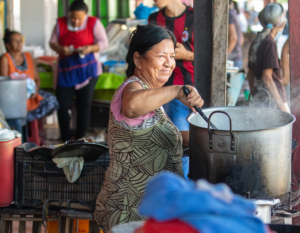How Street Food Vendors Are Important in the Fight Against Poverty
 Throughout the world, small businesses play an important role in the economy. By closely connecting with their communities, they can simultaneously promote economic activity and cultural preservation. This principle extends to urban Latin America, where many individuals engage in local microenterprises to earn a living. When considering global poverty, analysts must analyze how this highly localized entrepreneurship affects specific aspects of the issues.
Throughout the world, small businesses play an important role in the economy. By closely connecting with their communities, they can simultaneously promote economic activity and cultural preservation. This principle extends to urban Latin America, where many individuals engage in local microenterprises to earn a living. When considering global poverty, analysts must analyze how this highly localized entrepreneurship affects specific aspects of the issues.
Microenterprises and Small Businesses
To understand the significance of microenterprises and small businesses, it is necessary to explain what they are and how they function. A microenterprise is often described as a business with fewer than 10 employees and often requires a small amount of capital. Furthermore, they typically specialize in locally providing their goods or services.
Similarly, small businesses are firms that have a certain threshold for workers and revenues. Typically the range is under 100 employees. Such firms are extremely important in developing nations worldwide, employing around half of the population. Small businesses and microenterprises have increasingly become important in Latin America, highlighted by a 13.4% growth in the number of small businesses in 2022. This is important because the relationships between small businesses, economic growth and poverty reduction are positive. They create employment opportunities and foster self-reliance as well as entrepreneurship.
Street Food in Latin America
Many different types of small businesses and microenterprises are popular in Latin America, but street food is by far the most widespread. Street food vending mainly operates within the informal sector. This exposes a broader institutional failure related to the issue, which cannot be overlooked when considering poverty. This phenomenon is caused by poor living conditions in rural areas and a bad urbanization process that makes commuting long and difficult, as well as a lack of businesses with low-priced food near workplaces. As a result, those seeking better opportunities often enter the informal economy and must engage in businesses like this. However, there is hope, as street food vending effectively contributes to poverty reduction and destigmatizes marginalized urban populations. The industry generates an annual revenue of $127 billion and offers employment and community to those who otherwise wouldn’t have it.
Furthermore, the food these businesses typically sell, such as arepas or choripán, often represents staples of the culture’s cuisine. While it seems natural that an Argentinian vendor would sell Argentinian food, it leads to the recognition of that culture and those people who otherwise would not be there. Food is a powerful cultural tool that, due to its diversity, has shaped identity throughout Latin America. Through selling traditional foods, vendors can both preserve culture and foster a sense of community around it. This contributes to the fight against poverty, as greater consensus and a shared mission make policy implementation easier.
In Latin America, small businesses and microenterprises play a dual role in reducing poverty: they drive economic growth and preserve cultural identity. These enterprises, often rooted in communities, create jobs and opportunities for self-reliance. Street food vending, a prevalent informal industry, defies its challenges to provide employment and cultural recognition. By selling traditional foods, vendors not only sustain cultural heritage but also foster community cohesion, which in turn aids poverty alleviation efforts. In the face of poverty, these enterprises prove that economic and cultural vitality can go hand in hand.
– Eduardo Gonzalez del Valle
Photo: Flickr
